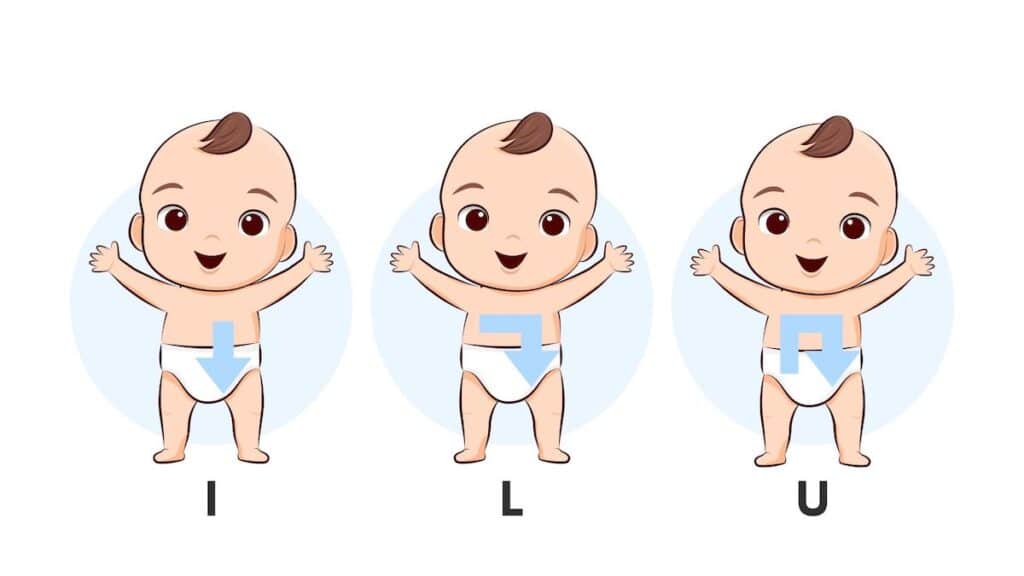Constipation in your baby after starting solids is a common issue many parents face as their little ones transition to food. As babies begin exploring new foods and textures, their digestive systems may need time to adjust, sometimes leading to constipation.
This is a natural part of the feeding process, and thankfully, there are safe and simple ways to help relieve constipation and support your baby’s digestion.
In this post, we’ll go over how to identify baby constipation, effective strategies, and small tweaks to make to their diet. In no time you’ll be free from the post-diaper investigation stress. 🙂
How to Know Your Baby is Constipated
When babies introduce solid foods, it changes the makeup of their gut bacteria – in a good way! (1) This can naturally change the color of their poop, the texture, and how fast they digest.
This change in the gut microbiome is often why we see changes in digestion and poop anytime there is a significant change in your child’s diet.
Plus, a healthy pattern or frequency of stools is different for all babies (and adults). For example, formula-fed babies often poop less often than breast-fed babies (2).
Because it’s hard to create a universal baseline, this is where I like to encourage parents – you know your child better than anyone. Rather than comparing your baby’s stool to the internet or a neighbor’s baby, look for significant changes in color or texture.
So how do we know if it’s considered constipation? According to The Nationwide Children’s Hospital, baby constipation can be defined as (3):
- Less volume of stool than their usual
- Small, hard pebbles OR large, hard balls
- Swollen abdomen
- Painful cramps when passing stool (more irritability when passing stool than normal)
3 Steps to Relieving Constipation in Baby After Starting Solids
1. Hydration & Fluid Intake
When babies start solids, they might naturally drink less breast milk or formula. If you notice any constipation symptoms, you may want to increase the ratio of milk to food given throughout the day. Or simply give them 1-2 ounces of milk at the start of solid food feeds.
If more hydration is needed, you can introduce small amounts of water to their diet starting at 6 months old (4). Offer up to 4 ounces of water in an open cup or cup with a straw (not a bottle) separately from formula or breastmilk.
Do not use the water to dilute milk! This can result in accidental underfeeding.
2. More Fiber
Your baby might need more high-fiber foods in their diet! Babies that consume more fiber and a high-variety diet are shown to have better gut bacteria which can prevent constipation (1).
High-fiber foods for babies include:
- Pears
- Plums
- Prunes
- Raspberries
- Avocado
- Peas (mashed)
- Beans (mashed)
- Kiwi
- Spinach
- Oranges
- Oatmeal
- Sweet Potato
- Quinoa
- Whole-wheat bread
- Legume-based pasta
Need help introducing Fiber? Let’s work together!
As a pediatric dietitian, I guide parents along the feeding journey. That means meal ideas, snack options, feeding schedules, and anything else your family needs! Schedule your free 10-minute consultation today.
3. Movement & Massage
Sometimes baby’s gotta move to get their bowels moving! General activity (crawling, tummy time, squirming) helps baby to release gas and get digestion started.
Tummy massages also help aid digestion! You can gently rub your infant’s stomach in an “I”, “L”, or “U” formation (see below) for 5-10 minutes. Alternatively, you can do “leg bicycles” while your baby is lying down.

Other Factors to Consider
Allergies
Sometimes a change in bowel movements can be a sign of food allergies. While this usually is an isolated event after feeding, sometimes it’s hard to tell if you’re introducing too many different foods all at once!
As always, contact your pediatrician if you are suspicious of a food allergy.
Diarrhea
Extreme constipation can appear as cyclical diarrhea. This is when your baby goes through a cycle of 2-7 days of constipation followed by several rounds of very loose stool.
If this occurs, your baby might need more extensive constipation treatment from your pediatrician.
When to Seek Medical Advice
Constipation can be a serious medical issue if left untreated. While it’s a very common and normal occurrence when starting solids, you might want to contact your pediatrician if:
- There is blood in the stool
- Your baby’s appetite significantly lowers
- Your baby does not stool for more than 2 days
Like I said before – you know your child best. If you notice an alarming difference in your child’s diapers or temperament, it’s always best to consult your pediatrician.
To wrap up, constipation is a common and manageable part of introducing solids, and with a few gentle adjustments, you can help ease your baby’s discomfort. Keeping them hydrated, incorporating fiber-rich foods, and practicing soothing techniques like massage can make a big difference.If you have questions or want more guidance introducing fiber-rich solids to your baby – let’s work together! Schedule your free 10-minute consultation call here.

Pingback: 20 Recipes for Constipation in Toddlers